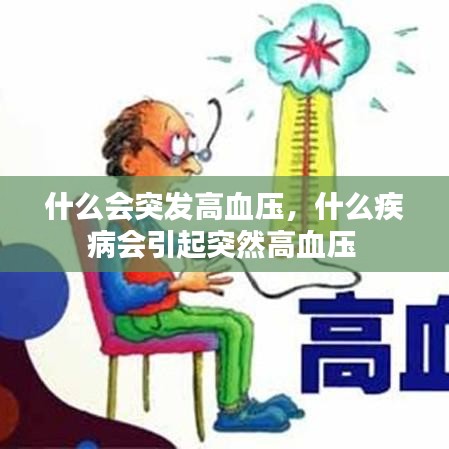<!DOCTYPE html>
Understanding Sudden HypertensionWhat is Sudden Hypertension?
Sudden hypertension, also known as acute hypertension, refers to a rapid increase in blood pressure to levels that are significantly higher than a person's usual blood pressure. This condition can be dangerous and may lead to serious health complications if not addressed promptly.
Causes of Sudden Hypertension
Sudden hypertension can be caused by a variety of factors, some of which are more common than others. Here are some of the most common causes:
Physical Stress
Physical stressors such as intense exercise, sudden changes in posture, or severe pain can cause a temporary spike in blood pressure. For example, when you stand up quickly after sitting or lying down, the blood vessels can constrict, leading to a sudden increase in blood pressure.
Emotional Stress
Emotional stress, such as fear, anger, or anxiety, can also trigger a sudden increase in blood pressure. The body's stress response, which involves the release of adrenaline and other hormones, can cause blood vessels to narrow and blood pressure to rise.
Medications and Substances
Some medications and substances can cause sudden hypertension. These include stimulants like amphetamines and cocaine, certain over-the-counter pain relievers, and even some prescription drugs. Dehydration can also contribute to high blood pressure by thickening the blood, making it harder for the heart to pump.
Underlying Medical Conditions
Several underlying medical conditions can lead to sudden hypertension. These include:
Chronic kidney disease: The kidneys help regulate blood pressure, and damage to the kidneys can lead to high blood pressure.
Thyroid disorders: An overactive thyroid (hyperthyroidism) can increase heart rate and blood pressure.
Obesity: Excess body fat can increase blood pressure by putting extra pressure on the heart and blood vessels.
Diabetes: High blood sugar levels can damage the blood vessels and nerves that control blood pressure.
Environmental Factors
Environmental factors can also contribute to sudden hypertension. These include:
High altitude: Being at high altitudes can cause blood vessels to constrict, leading to increased blood pressure.
Hot weather: High temperatures can cause blood vessels to dilate, which can lead to a sudden drop in blood pressure, but can also cause an increase in blood pressure in some individuals.
Noise pollution: Chronic exposure to high levels of noise can increase stress hormones, which can lead to higher blood pressure.
Risk Factors
Several risk factors can increase the likelihood of developing sudden hypertension. These include:
Age: The risk of high blood pressure increases with age.
Family history: Having a family history of hypertension can increase your risk.
Unhealthy lifestyle: Smoking, excessive alcohol consumption, and a diet high in salt and saturated fats can contribute to high blood pressure.
Obesity: Excess body fat, particularly around the waist, can increase blood pressure.
Lack of physical activity: Regular physical activity can help control blood pressure.
Prevention and Management
Preventing and managing sudden hypertension involves addressing the underlying causes and adopting a healthy lifestyle. Here are some strategies:
Eat a balanced diet: Focus on fruits, vegetables, whole grains, and lean proteins, and limit foods high in salt, sugar, and saturated fats.
Exercise regularly: Aim for at least 150 minutes of moderate-intensity aerobic activity per week, along with strength training exercises
转载请注明来自亳州市能玺建材销售有限公司,本文标题:《什么会突发高血压,什么疾病会引起突然高血压 》












 皖ICP备2021016178号-1
皖ICP备2021016178号-1
还没有评论,来说两句吧...